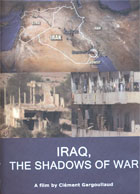
Iraq, The Shadows of War 2010
Distributed by CineFete, 1586 Fleury St. East, Suite 210, Montreal, Canada H2C 156; 800-858-2183
Produced by Guillaume Pérès, Jean-Luc Millan
Directed by Clément Gargoullaud
DVDd, color, 25 min.
Sr. High - Adult
Middle Eastern Studies, Area Studies, Environmental Studies, International Relations, Transportation
Date Entered: 05/20/2011
Reviewed by Gisele Tanasse, University of California BerkeleyDriven by a curiosity to see how, Iraq's "most maritime" city, Basra, has survived 3 wars in 30 years, a group of journalists attempt to travel up the Shatt Al-Arab. The river, Iraq's only outlet to the Persian Gulf, serves as a hotly contested border between Iraq and Iran. It has been ravaged by decades of war, filled in spots to the brim with carcasses of abandoned ships, as unemployed sailors and dock hands look on in desperation, waiting for the government to act. Fishermen, plagued by environmental problems, bemoan their empty holding tanks and grieve over the demise of the world's largest date palm groves. Basra, once known for its culture and lush roses, is now highly controlled by check points, difficult to navigate and very dangerous for a crew of European journalists. Their guide notes that they are "good targets for good money," and as a crowd of thousands clamoring for new jobs at the South Oil Company suggest, there is little legitimate work to be found outside of the Iraqi army. While we are privy to unprecedented access to one of the only cargo ships that still regularly navigates the river, it is not long before the camera crew is kicked off the boat for asking too many political questions of the very apolitical captain. That experience is the most unfortunate example of faltering political savvy on the part of the journalists, but the producers' choice to use cheesy voice-overs instead of English subtitles when Arabic is spoken is also unfortunate. Not only are we robbed of the emotional cadence of their voices, it occasionally proves confusing in the interactions between check point soldiers and the guide. Though this short film is recommended for its unique presentation of the day to day hardships of Iraqis living along the Shatt Al-Arab, poor choices in post-production, including aspect ration problems with some of the footage, distract from its compelling content.